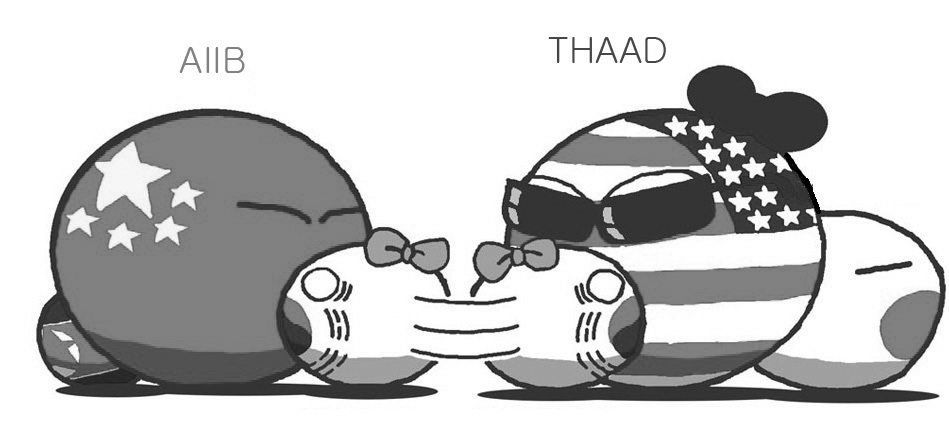|
Recently in the news, security and economic issues came up between Korea, China and the US. In terms of national security, the Americans insisted on establishing THAAD (Terminal High Altitude Area Defense) in the region, while
China sent a warning to Seoul, not to do so. On the other hand, China invited Korea to join the AIIB (Asian Infrastructure Investment Bank) while the US tried to prevent it. Korea has become the hot potato of Asia. What has happened to bring us here today?
THAAD is a high altitude missile defense system promoted by the US as a key element of a missile defense system. It is used to defend troops and equipment, populated areas, and critical facilities from short-range ballistic missiles. If we
establish THAAD in Korea, it would obviously be beneficial to our national security. However we could defend ourselves not only from North Korea, but also from attacks from China. Therefore, China keeps pressing Korea to deny the US permission to install THAAD. The Korean government is also hesitant, but for different reasons. Koreans argue the system comes with a high price and is still in the experimental stage.
On the economic front, the AIIB is an investment bank that was created by China. Recently the Chinese asked Korea to join in on their economic efforts. So what can be good or bad with this proposal? If Korea joined the AIIB, we could increase our status internationally. South Korea has a small share in international financial institutions. If they become a member of AIIB, they can strengthen their global positioning. Moreover, there are some advantages to be supported by China such as the liquidation of renmibi, establishing a settlement bank.
The US and China had quite different reactions about the deployment of THAAD in South Korea. We interviewed Professor Kim Jin-ho (Dept. of Political Science and International Relations) to find out what kinds of benefits South Korea might enjoy from the domestic deployment of THAAD. Prof. Kim said, South Korea could benefit from increased national security and increased national defense power. In short, the deployment of THAAD will prevent North Korea from firing nuclear weapons at us, making it possible for South Korea to defend itself from nuclear attack. It will also strengthen our military relationship with the US. We asked him if there were any problems that might result from the deployment of THAAD. Professor Kim said “If we install THAAD on the Korean peninsula, we will improve our relationship with the US. However, we will incur hostility from China, a relationship upon which 30% of our exports are currently dependent. As a result, China might inflict economic pressure on South Korea and they might consider South Korea as an enemy if they were to wage a war against the US.”
In spite of these plausible problems in the future, Professor Kim added that it was the right decision to install THAAD in South Korea. Deployment of the THAAD is related to national security, so we have to make this decision by ourselves, independently from the influence of China. In other words, we
should pursue an economic relationship with China through economic cooperation rather than trying to maintain our economic relationship with China by negotiating away our ability to provide national security.
This isn’t the only hot issue between our tri-nations at the moment. There are a lot of controversies about the AIIB too. So we asked the professor about the goals of the AIIB and whether or not he felt it was necessary for us to join. Professor Kim said the ultimate goal of the AIIB is the establishment of a new economic framework where China plays the lead role. China is known as the Silk Road, reaching all the way to Europe.
In short, China founded the AIIB to establish a new economic district against where China takes the lead instead of the US or Japan. We asked him if we’re already participating in the Asian Development Bank (ADB), then why should we
participate in the AIIB? He said, “Regardless of our participation in the ADB, the AIIB offers us the opportunity to help other countries in Asia that we currently can’t publicly support such as North Korea, and we might be able to establish amicable relations with North Korea though the AIIB.” Moreover, the professor pointed out that we failed to get a significant position in the ADB, but we might still get one in the AIIB. He feels we have no option but to join. The most important thing we should consider now is what we should do inside the giant Chinese economic framework.
Both China and the US are currently important partners for Korean and neither can be ignored in Korean diplomacy. During the Joseon Dynasty, King Gwang-hae kept his country together by practicing intelligent diplomacy. Korea today is a
hot potato in Asia and we can only hope that by practicing intelligent diplomacy we can find solutions to appease all our partners while ensuring maximum benefits for our own.
Lee Ji-seon, Park Seh-hoon dkherald@hotmail.com


![[Campus Magnifier] Let's Surf the Library!](/news/photo/202404/12496_1765_4143.jpg) [Campus Magnifier] Let's Surf the Library!
[Campus Magnifier] Let's Surf the Library!
![[Campus Magnifier] Let's Surf the Library!](/news/thumbnail/202404/12496_1765_4143_v150.jpg)





